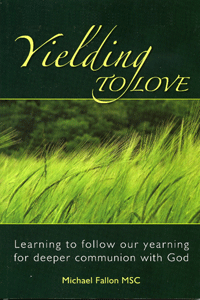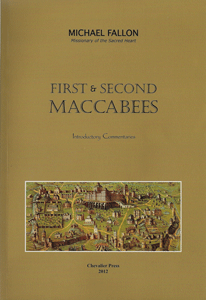Books by Michael Fallon msc
I. Published by Chevalier Press
1 Roma Avenue, Kensington 2033, Australia (www.annals.com.au)
[email: annalsaustralasia@gmail.com; Phone: 61+2 96627894].
A Companion to the Catechism of the Catholic Church

In introducing the Catechism, Pope John-Paul II declared: ‘it is meant to encourage and assist in the writing of new local catechisms, which take into account various situations and cultures, while carefully preserving the unity of faith and fidelity to Catholic doctrine’. What I am offering is not a catechism, but it in my prayer that you, the reader, will indeed find this book a true companion, as you delve into the rich resource which the Catholic Church has offered us in the Catechism. Published by Chevalier Press, 1 Roma Avenue Kensington NSW 2033 Phone (02) 9662 7894. Fax (02) 9662 1910. Cost $25.00
The Old Testament: an introduction to writings sacred to Jews and Christians
(221 pages). Published by Chevalier Press, 1 Roma Avenue Kensington NSW 2033 Phone (02) 9662 7894. Fax (02) 9662 1910. Cost $20.00. Click HERE
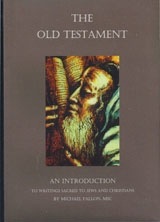
Praying the Psalm with Jesus (2018)
(450 pages). Published by Chevalier Press, 1 Roma Avenue Kensington NSW 2033 Phone (02) 9662 7894. Fax (02) 9662 1910. Cost $40.00. Click HERE

* * * * * * * * * * * * *
Introductory Commentaries on the Sacred Scripture
All these commentaries have the same format. Each page is divided into 2 columns. The outside column has the Scripture text in bold. The inside column has the commentary. The idea is that the Scripture text is sitting there before the reader's eye as he/she reads the commentary.
The following is offered as an example. It is pages 256 and 257 of my commentary on Luke, and it covers the first half of the parable of the prodigal son.
page 256
Then Jesus said, ‘There was a man who had two sons. The younger of them said to his father, “Father, give me the share of the property that will belong to me.” So he divided his property between them.A few days later the younger son gathered all he had and travelled to a distant country, and there he squandered his property in dissolute living. When he had spent everything, a severe famine took place throughout that country, and he began to be in need. So he went and hired himself out to one of the citizens of that country, who sent him to his fields to feed the pigs. He would gladly have filled himself with the pods that the pigs were eating; and no one gave him anything. God invites all to the feast. We are free to accept or not accept his invitation |
This parable is neatly arranged in two sections. The first section focuses on the younger son who accepts his Father’s invitation to join in the celebration which has been organised for his welcome home. The second section focuses on the elder son. He, too, is invited to the banquet, but we are not told whether he accepts or no.t At the beginning of the story, the younger son is portrayed as being completely self-centred and as having no regard for his father. He treats his father as though he were already dead by asking for his share in the inheritance. Then, when his father accedes to his request, he sells his half of the property, depriving his father of the produce and alienating for ever the family inheritance. He squanders everything in extravagant living, finds himself destitute, and ends up in what is for a Jew the utterly humiliating position of feeding unclean animals. We are told that ‘no one gave him anything’. He would have been happy with the ‘pods’ – the bitter and unnourishing berries from the thorny carob bush. The turning point in the story comes when the boy reflects on his condition. He thinks of his father, and is confident that his father will accept him back. There is no question yet of genuine repentance. He still has no interest in a personal relationship with his father, but decides to use him to survive. He wants to keep his independence by being a hired hand. In this way he will not have to seek reconciliation or develop any kind of proper relationship either with his father or his brother. All he wants is to be assured of something to eat. |
page 257
| He sets off, and then the focus changes to the father. It is the father’s immense love that brings about the boy’s repentance. The father has been on the look out for the boy all the time, longing for his return. He catches sight of him while he is still a long way off and he is ‘filled with compassion’. It is this compassion that will bring about the boy’s change of attitude. The father casts dignity aside and runs through the village, eager to reach his boy before any of the other villagers decided to hurt him. What the boy has done to his father threatens the basic social structure of village life. The father throws his arms around the boy and kisses him. After that no one can reject the boy without also rejecting the father. This display of unconditional love moves the boy to true repentance. For the first time we see the dawning of a real son-father relationship. The father’s love shows him that it is the relationship that is paramount, not the lost property. Mending the relationship is something that the boy cannot do for all his scheming; it depends on the father’s grace. The young lad is overwhelmed with humility and, for the first time, allows himself to be truly a son. When we compare what the boy said with what he planned to say, we see that all reference to being a hired hand has been dropped. In accepting the unmerited gift of being a son, the boy is accepting the need to be reconciled with the older brother, and to be once again under his father’s authority. It will also mean setting aside the satisfaction of having earned his own way back. The father overwhelms him with welcoming love. The festive robe in which he has him clothed requires of everyone that they give the boy the respect due to the father himself. The ring demonstrates absolute trust, and the slaves are required to look up to the boy as to their master. A calf is killed – an indication that the whole village is invited to the welcoming home festivities. The lost boy has been found. ‘They began to celebrate’. A happy ending, thanks to the amazing love of the father. The boy, like the tax collectors and sinners (15:1), accepted the invitation with joy. |
I will get up and go to my father, and I will say to him, ‘Father, I have sinned against heaven and before you; I am no longer worthy to be called your son; treat me like one of your hired hands.’”
|
1. Introductory Commentaries on the Older Testament
2. Introductory Commentaries on the Newer Testament
| Matthew | Mark | Luke | John |
| Acts | Paul | Letters | Apocalypse |
The Old Testament: An Introduction to writings sacred to Jews and Christians
(221 pages). Published by Chevalier Press, 1 Roma Avenue Kensington NSW 2033 Phone (02) 9662 7894. Fax (02) 9662 1910. Cost $20.00. Click HERE

The Book of Genesis
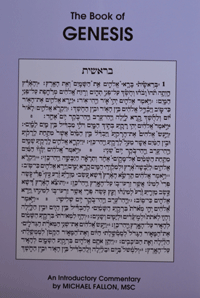 UNDERSTANDING the kind of literature that we find in the Book of Genesis is fundamental to how we read this inspired work. This is especially important today because of the insistence of many who think that truth in the inspired word requires that it make only statements of fact, as though God could not inspire poetry, drama and saga. They resist the findings of scientific inquiry, both literary and archaeological.
UNDERSTANDING the kind of literature that we find in the Book of Genesis is fundamental to how we read this inspired work. This is especially important today because of the insistence of many who think that truth in the inspired word requires that it make only statements of fact, as though God could not inspire poetry, drama and saga. They resist the findings of scientific inquiry, both literary and archaeological.
In doing so they misinterpret
Scripture
,and fail to appreciate the
wonderful richness of this literature.
246 pages $25
[includes GST and postage within Australia]
A Priestly Kingdom and a Holy Nation
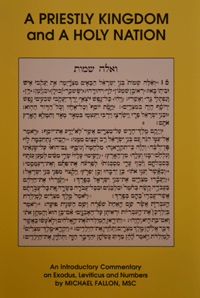 EXODUS tells the story of God’s action in freeing a group of slaves from forced labour in Egypt, and leading them to Mount Sinai. Numbers completes the journey from Sinai to within sight of the Jordan River and the Promised Land. Between Exodus and Numbers is Leviticus. It lists the cult and other laws that had developed over the centuries and portrays them as having been commanded by God to Moses on the holy mountain. At one level Moses is centre stage, but the focus is on the wonderful Providence
EXODUS tells the story of God’s action in freeing a group of slaves from forced labour in Egypt, and leading them to Mount Sinai. Numbers completes the journey from Sinai to within sight of the Jordan River and the Promised Land. Between Exodus and Numbers is Leviticus. It lists the cult and other laws that had developed over the centuries and portrays them as having been commanded by God to Moses on the holy mountain. At one level Moses is centre stage, but the focus is on the wonderful Providence
that brought these escaped slaves
to a new idea of God as the God, not
of the powerful,but of the poor, the weak,
the widow and the orphan.
The God of Moses, the God of the people
of Israel, is a God who hears the cry of the poor.
441 pages $30 [includes GST and postage within Australia]
The Books of Deuteronomy, Joshua and Judges
 DEUTERONOMY is a presentation of the essence of the religion of Israel. It reads as the final exhortation of Moses to the people before he hands over command to Joshua and dies on Mount Nebo, having seen but not entered the Promised Land. Deuteronomy refers back to the events that are recorded in Exodus and Numbers. Presented as it is as a long exhortation it highlight the fact that Bible texts were written to be proclaimed when the people assembled for worship.
DEUTERONOMY is a presentation of the essence of the religion of Israel. It reads as the final exhortation of Moses to the people before he hands over command to Joshua and dies on Mount Nebo, having seen but not entered the Promised Land. Deuteronomy refers back to the events that are recorded in Exodus and Numbers. Presented as it is as a long exhortation it highlight the fact that Bible texts were written to be proclaimed when the people assembled for worship.
It was
composed
to encourage the people
to remember their past and to be faithful
to God who had chosen them as his own.
It invites them (and through them us)
to see the continuing activity of God in each
new generation. 355 pages $30 [includes GST
and postage within Australia]
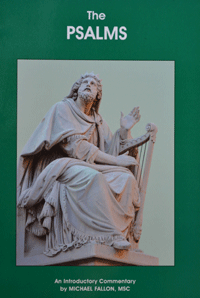 Writing in Alexandria in the fourth century, Saint Athanasius has this to say: 'The BOOK OF PSALMS is like a garden which contains the fruits of all the other books, grows a crop of song and so adds its own special fruit to the rest. It seems to me that for the person who recites them the psalms are like a mirror in which we may see ourselves and the movements of our heart and mind and then give voice to them.' 512 pages $40 [includes GST and postage within Australia]
Writing in Alexandria in the fourth century, Saint Athanasius has this to say: 'The BOOK OF PSALMS is like a garden which contains the fruits of all the other books, grows a crop of song and so adds its own special fruit to the rest. It seems to me that for the person who recites them the psalms are like a mirror in which we may see ourselves and the movements of our heart and mind and then give voice to them.' 512 pages $40 [includes GST and postage within Australia]
Israel's 8th Century Prophets [Amos, Hosea, Isaiah, Micah]
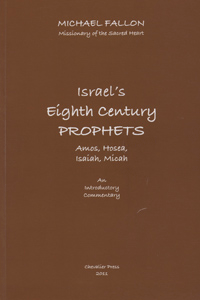 The decades just before the middle of the eighth century BC were years in which Israel and Judah experienced relative peace and prosperity. Sadly, along with this went injustice. All four of our prophets speak out against this. The second half of the century witnessed the aggressive expansion of Assyria first into Israel and then into Judah. Hosea, Isaiah and Micah all had to deal with the effects of this expansion. Their guidance was ignored for the most part by their contemporaries. 233 pages $20 [includes GST and postage within Australia]
The decades just before the middle of the eighth century BC were years in which Israel and Judah experienced relative peace and prosperity. Sadly, along with this went injustice. All four of our prophets speak out against this. The second half of the century witnessed the aggressive expansion of Assyria first into Israel and then into Judah. Hosea, Isaiah and Micah all had to deal with the effects of this expansion. Their guidance was ignored for the most part by their contemporaries. 233 pages $20 [includes GST and postage within Australia]
Israel's 7th Century Prophets [Zephaniah, Nahum, Habakkuk, Jeremiah]
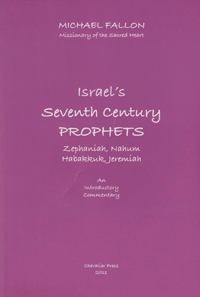 THE PROPHETS covered in this volume ministered in the eventful final three decades of the seventh century, decades which saw the ambitious attempts by King Josiah to restore the kingdom of David. The seventh century ended with the capture of Jerusalem and the exile of its king and leading citizens, tragedies echoed in the oracles of Habakkuk and Jeremiah. 283 pages $20 [includes GST and postage within Australia]
THE PROPHETS covered in this volume ministered in the eventful final three decades of the seventh century, decades which saw the ambitious attempts by King Josiah to restore the kingdom of David. The seventh century ended with the capture of Jerusalem and the exile of its king and leading citizens, tragedies echoed in the oracles of Habakkuk and Jeremiah. 283 pages $20 [includes GST and postage within Australia]
Israel's 6th Century Prophets [Ezekiel, Isaiah 40-66, Haggai and Zechariah]
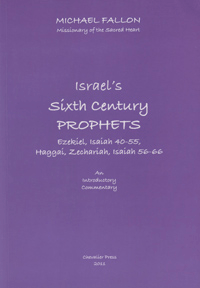 EZEKIEL and the Isaiah School responsible for Isaiah 40-55 wrote from exile in Babylon. Haggai, Zechariah and the Isaiah School responsible for Isaiah 56-66 wrote from Judah in the years after the return from exile. 353 pages $25 [includes GST and postage within Australia]
EZEKIEL and the Isaiah School responsible for Isaiah 40-55 wrote from exile in Babylon. Haggai, Zechariah and the Isaiah School responsible for Isaiah 56-66 wrote from Judah in the years after the return from exile. 353 pages $25 [includes GST and postage within Australia]
Israel's 5th Century Prophets [Obadiah, Zechariah, Joel, Malachi, Jonah] and Daniel.
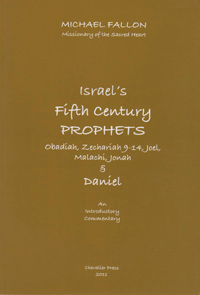 THE AIM of this Introductory Commentary is to attempt to discover and express what it was that the prophets of fifth century Israel (and second century Daniel) intended to say by their words, how their contemporaries understood them, and why people cherished, preserved, copied, edited and handed on their words. This is harder to do for fifth century Judah than for earlier centuries because of the poverty of the historical record, and because the prophets, living under Persian domination, were less interested in history
THE AIM of this Introductory Commentary is to attempt to discover and express what it was that the prophets of fifth century Israel (and second century Daniel) intended to say by their words, how their contemporaries understood them, and why people cherished, preserved, copied, edited and handed on their words. This is harder to do for fifth century Judah than for earlier centuries because of the poverty of the historical record, and because the prophets, living under Persian domination, were less interested in history
than in their hope of divine intervention.
167 pages $15
[includes GST and postage within Australia]
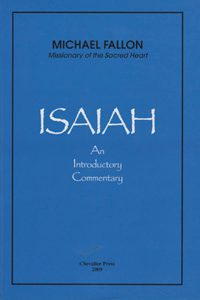 THE BOOK OF ISAIAH covers over three hundred years of Judah's history, and reflects on the presence and action of YHWH in that history, including the years that led up to the Fall of Jerusalem, the traumatic years of exile in Babylon, and the difficult years after the exile, in which the he School of Isaiah struggled for the soul of Judah. 271 pages $25 [includes GST and postage within Australia]
THE BOOK OF ISAIAH covers over three hundred years of Judah's history, and reflects on the presence and action of YHWH in that history, including the years that led up to the Fall of Jerusalem, the traumatic years of exile in Babylon, and the difficult years after the exile, in which the he School of Isaiah struggled for the soul of Judah. 271 pages $25 [includes GST and postage within Australia]
The Festival Scrolls [The Song of Songs, The Book of Ruth, Lamentations, Ecclesiastes, Esther]
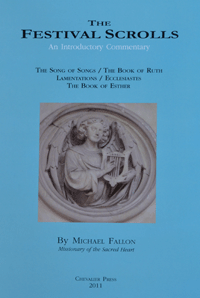 THESE SCROLLS were preserved in the hope that later generations, through prayerful reflection, would come to know God and how we are to live so as to welcome God's blessings. The continued use of these scrolls by the Jewish community in the various festivals that are part of their liturgical calendar is witness enough to the value attached to them. 216 pages $20 [includes GST and postage within Australia]
THESE SCROLLS were preserved in the hope that later generations, through prayerful reflection, would come to know God and how we are to live so as to welcome God's blessings. The continued use of these scrolls by the Jewish community in the various festivals that are part of their liturgical calendar is witness enough to the value attached to them. 216 pages $20 [includes GST and postage within Australia]
The Book of Proverbs, the Book of Job
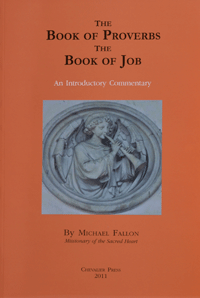 THE BOOK OF PROVERBS is a collection of the oldest wisdom sayings of Ancient Israel. It includes instructions and suggestions on how to live a productive and fulfilled life. The 'wise sayings' are the fruit of reflection on life experience and on Israel's faith. The BOOK OF JOB, acknowledged as a poetic masterpiece, examines human suffering, and in doing so challenges traditional 'wisdom'. 228 pages $20 [includes GST and postage within Australia]
THE BOOK OF PROVERBS is a collection of the oldest wisdom sayings of Ancient Israel. It includes instructions and suggestions on how to live a productive and fulfilled life. The 'wise sayings' are the fruit of reflection on life experience and on Israel's faith. The BOOK OF JOB, acknowledged as a poetic masterpiece, examines human suffering, and in doing so challenges traditional 'wisdom'. 228 pages $20 [includes GST and postage within Australia]
First & Second Samuel. First Chronicles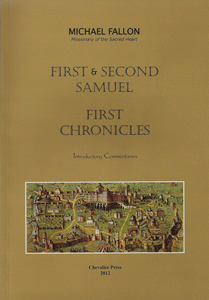
The Books of Samuel tell the story of the beginnings of the monarchy in Israel, first King Saul and then King David. The stories speak of what the nation and its leaders are called to be. Hence the central role of the prophet Samuel and the inclusion of these writings among the Prophetic Scrolls. Writing some centuries after the Books of Samuel, the author of First Chronicles revisits the story of King David, portraying him as the ideal king, and tracing back to him the religious
practices that were current in the Judaism
of the fourth century BC.
211 pages $20.00 [includes GST and postage within Australia].
First & Second Kings. Second Chronicles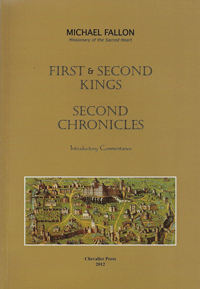
The Books of Kings tell the story of King Solomon and the kings of Israel and Judah down to the destruction of Jerusalem in 587BC. The aim of the authors was not to repeat the history, but to offer an interpretive commentary, focusing on the way they understood God to have been present and active in their past. Hence the central role of the prophets. Hence the inclusion of these writings among the Prophetic Scrolls. The author of Second Chronicles revisits the story of the kings of Judah tracing the history of the religious practices that were current in the Judaism of the fourth
century BC. 250 pages $20.00 [includes GST
and postage within Australia]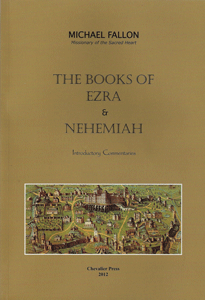
The Book of Ezra tells the story of the return of the exiles from Babylon to Judah, and the re-building of the temple. Drawing on the memoirs of Ezra, it goes on to record his arrival in Judah in 458BC and his work in reforming the life of the community according to the law, which he brought with him from Babylon. Tradition looks on him as a second Moses, who established the foundations of post-exilic Judaism.
The Book of Nehemiah draws on Nehemiah’s memoirs to tell the story of his period as governor of Judah, firstly from 445-433BC, and then for a second term some years later. It was he who saw to the rebuilding of the walls of Jerusalem. 85 pages $10.00 [includes GST and postage within Australia].
These two very different books tell the story of the successful struggle of the Jews to hold on to their faith and their religious traditions against the overwhelming pressure to be part of the Hellenistic culture that threatened to swamp them in the second century BC. I Maccabees highlights the heroic resistance of the priest Mattathias, and the brilliant and finally successful guerrilla campaign led by his sons Judas, Jonathan and Simon. II Maccabees was written a decade later.
It recognizes the providential significance of Judas Maccabaeus (after whom the books are named), but the author’s focus is on God, not on the Hasmonaean dynasty of which he clearly disapproves. 186 pages $15.00 [includes GST and postage within Australia].JTobit and Judith
Tobit is a short story, a romance. The author, writing somewhere in the East, and probably in the third century BC, wants his Jewish contemporaries to appreciate the blessings of the covenant they have with their God, and the benefits that flow from a life lived in obedience to the Torah. The story has a lot to tell us about living a noble and just life, expressed in acts of kindness.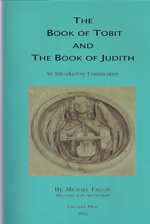
Judith, too, is a story, composed in Judah in the last decades of the second century BC. The heroine is a woman, Judith, who lives in an imaginary town in Samaria. She is victorious over the general of the most powerful army in the world. The author wants to encourage his contemporaries to persevere in their faith. Their situation may appear impossible, and their enemies invincible, but only God is invincible and God is committed to his people. They must never lose faith or abandon their traditional way of life in obedience to the Torah. 113 pages $10
[includes GST and postage within Australia]
Wisdom of Ben Sira & Wisdom of Solomon
As well as such inspiring passaghes as Chapter 24 (a hymn to Wisom), Chapter 34:14-20 (on divine providence), Chapter 39:12-35 (in praise of the Creator), and the concluding hymn (51:13-30), we can find many gems of wisdom from Ben Sira, a remarkable teacher whose career in Jerusalem spanned the final decades of the third century BC, and continued into the early years of the second century.
There are times (but very few) where Christians reading this text
can imagine Jesus saying: ‘It was 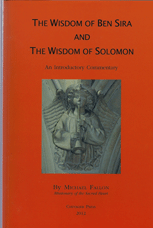 said to you of old, but I say’.
said to you of old, but I say’.
One obvious example is Chapter 12:1-7, where the author assumes that God hates sinners, and encourages his students to do the same. He speaks quite beautifully about forgiveness, but it does not extend to one’s enemies. He displays a special antipathy to the Samaritans. He encourages a caring attitude to those in need, but his attitude to women witnesses to the prevailing assumption that they are inferior to men. However, all in all, Ben Sira offers much practical and wise advice, as relevant in our day as it was in his.
The author of the Wisdom of Solomon composed his work two centuries later, in Alexandria, during the Roman period. He draws on the same Jewish tradition, but he also draws on current Hellenistic philosophy with which he was very familiar. He writes in Greek, and when he covers themes found also in Sirach he uses the language, not of the Septuagint, but of the Hellenist schools. He wants his students to engage with Hellenism, but to value the special wisdom that is their patrimony as Jews. 272 pages $20 [includes GST and postage within Australia]
2. Introductory Commentaries on the Newer Testament
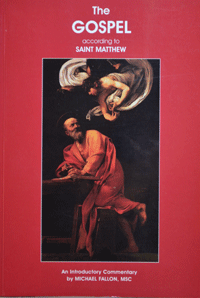 It is the Spirit of Jesus who continues to use MATTHEW'S text to draw us into a deeper understanding of and love for God, revealed so beautifully in Matthew's portraits of Jesus. Matthew is also intensely interested in the Church, a community of faulty human beings in whose midst is the risen Jesus, who is constantly teaching, forgiving and drawing us into ever closer communion with one another as we strive to carry on his redemptive mission in the world. 395 pages $25 [Includes GST and postage within Australia]
It is the Spirit of Jesus who continues to use MATTHEW'S text to draw us into a deeper understanding of and love for God, revealed so beautifully in Matthew's portraits of Jesus. Matthew is also intensely interested in the Church, a community of faulty human beings in whose midst is the risen Jesus, who is constantly teaching, forgiving and drawing us into ever closer communion with one another as we strive to carry on his redemptive mission in the world. 395 pages $25 [Includes GST and postage within Australia]
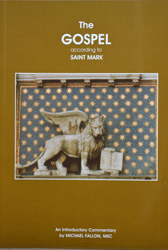 MARK'S GOSPEL is very conscious of conflict. In this too he has a lot to teach us. Having lost his two mentors, Peter and Paul, in Nero's persecution in the middle sixties, Mark completed his gospel during the catastrophe of the Jewish-Roman war that broke out in 66AD. Many Christians must have been wondering about the reality of the salvation brought by Jesus. Similar questions face us today. 293 pages $25 [Includes GST and postage within Australia]
MARK'S GOSPEL is very conscious of conflict. In this too he has a lot to teach us. Having lost his two mentors, Peter and Paul, in Nero's persecution in the middle sixties, Mark completed his gospel during the catastrophe of the Jewish-Roman war that broke out in 66AD. Many Christians must have been wondering about the reality of the salvation brought by Jesus. Similar questions face us today. 293 pages $25 [Includes GST and postage within Australia]
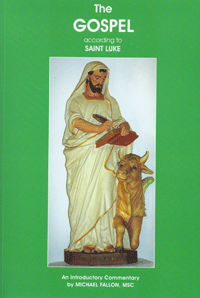 LUKE'S GOSPEL is intricately and delicately composed to highlight his main themes. He is especially interested in God's action in history, seen in the ministry of Jesus and carried forward in the ministry of the apostles and Paul. Luke is inviting his readers to examine their own religious experience and to discover, especially in their experience of God's forgiveness, and in their endurance as disciples, the action of God's Holy Spirit binding them to Jesus
LUKE'S GOSPEL is intricately and delicately composed to highlight his main themes. He is especially interested in God's action in history, seen in the ministry of Jesus and carried forward in the ministry of the apostles and Paul. Luke is inviting his readers to examine their own religious experience and to discover, especially in their experience of God's forgiveness, and in their endurance as disciples, the action of God's Holy Spirit binding them to Jesus
and enabling them to persevere as Jesus' disciples,
continuing his mission in the world. 375 pages $25
[Includes GST and postage within Australia]
The Gospel of John
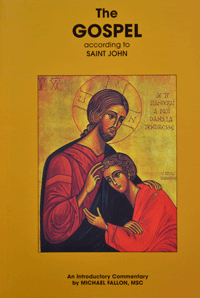 Our earliest systematic commentary on JOHN'S GOSPEL comes from Origen, writing in Alexandria c.230AD. He states: 'We might dare to say that the Gospels are the first fruits of all Scriptures, but that the first fruits of the Gospels is that according to John, whose meaning no one can understand who has not lain on Jesus' breast nor received Mary from Jesus to be his mother also. However, he who would be another John must become like John ... For indeed everyone who has been
Our earliest systematic commentary on JOHN'S GOSPEL comes from Origen, writing in Alexandria c.230AD. He states: 'We might dare to say that the Gospels are the first fruits of all Scriptures, but that the first fruits of the Gospels is that according to John, whose meaning no one can understand who has not lain on Jesus' breast nor received Mary from Jesus to be his mother also. However, he who would be another John must become like John ... For indeed everyone who has been
perfected "no longer lives, but Christ
lives in him" (Galatians 2:20), and since
Christ lives in him it is said of him to
Mary "Behold your son". ' 386 pages $25
[Includes GST and postage within Australia]
The Acts of the Apostles
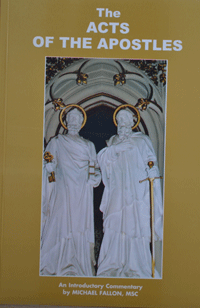 The more we know of the first century Hellenistic world the better does Luke appear as a historian. Upon close examination claimed discrepancies between ACTS and what we know of Paul from Paul's own letters disappear and Luke's work is revealed as a rich resource for our understanding of Paul from one of Paul's collaborators. At the same time it is important to realise that the centre of attention is not Paul or any
The more we know of the first century Hellenistic world the better does Luke appear as a historian. Upon close examination claimed discrepancies between ACTS and what we know of Paul from Paul's own letters disappear and Luke's work is revealed as a rich resource for our understanding of Paul from one of Paul's collaborators. At the same time it is important to realise that the centre of attention is not Paul or any
other apostle. Luke never allows our
attention to stray from gazing with
wonder at what the Spirit of the risen
Christ is doing in the world to continue
Jesus' mission of revealing God as a God
of love who is constantly drawing people
together, whatever their racial identity,
into a community of love. 264 pages $25
[Includes GST and postage within Australia]
St Paul: New Testament Letters Volume 1
 The author writes: 'In some ways this commentary has been my life's work. I was first impressed by the breadth of Paul's thought during my studies in the seminary during the 50's. I was especially moved by the obvious love of the man and by the courage with which he carried out his mission of taking the best of the faith of Abraham and Moses – the faith as lived by Jesus – to the Gentile world. I found the universality of his thought inspiring and wonderfully
The author writes: 'In some ways this commentary has been my life's work. I was first impressed by the breadth of Paul's thought during my studies in the seminary during the 50's. I was especially moved by the obvious love of the man and by the courage with which he carried out his mission of taking the best of the faith of Abraham and Moses – the faith as lived by Jesus – to the Gentile world. I found the universality of his thought inspiring and wonderfully
relevant to our times, for we know
that if 'salvation' means anything it
must concern the human race, and not
a special privileged group'. 769 pages $50
[Includes GST and postage within Australia]
Sts James, Peter, John, Jude, and Hebrews: New Testament Letters Volume 2
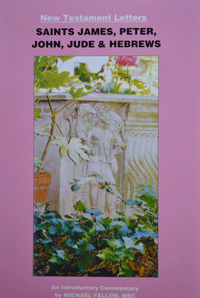 These marvellous LETTERS give us an insight into the wealth, depth and variety of the ways in which the Christian communities of the first century thought of Jesus, of the God of love whom he revealed, and of what it means to live as a disciple of Jesus, open to the grace of God's Spirit. 291 pages $25 [Includes GST and postage within Australia]
These marvellous LETTERS give us an insight into the wealth, depth and variety of the ways in which the Christian communities of the first century thought of Jesus, of the God of love whom he revealed, and of what it means to live as a disciple of Jesus, open to the grace of God's Spirit. 291 pages $25 [Includes GST and postage within Australia]
The Apocalypse
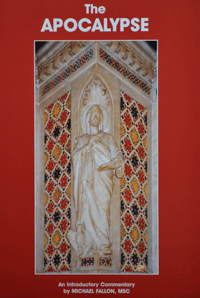 THE APOCALYPSE is a dramatic and richly symbolic manifesto of the ultimate victory of love, of the values of Christ over against the oppression of the Roman state at the close of the first century. Modern attempts to identify today's events in its pages are misguided, for the aim of its author was to help his contemporaries see the events of their own day in the light of faith, not to offer them tantalising images of future events which could have no relevance for them. 131 pages $14 [Includes GST
THE APOCALYPSE is a dramatic and richly symbolic manifesto of the ultimate victory of love, of the values of Christ over against the oppression of the Roman state at the close of the first century. Modern attempts to identify today's events in its pages are misguided, for the aim of its author was to help his contemporaries see the events of their own day in the light of faith, not to offer them tantalising images of future events which could have no relevance for them. 131 pages $14 [Includes GST
and postage within Australia]
Companion to the Catechism of the Catholic Church
Not yet published. Click HERE
II. Published by St Pauls Publications
35 Meredith Street, PO Box 906, Strathfield NSW 2135, Australia [61+2 9394 3400] [http://www.stpauls.com.au]
‘A Priest after my own Heart: Exploring Priestly Spirituality’, 2001 (172 pages). This is Out of Print, but may now be accessed from this website [mbfallon.com] Go to link 'Priesthood'.
Yielding to Love: Learning to follow our yearning for deeper communion
with God' 2005 (206 pages RRP $24.95. This is also out of print, but may now be accessed from this website. Go to link 'Prayer'.
